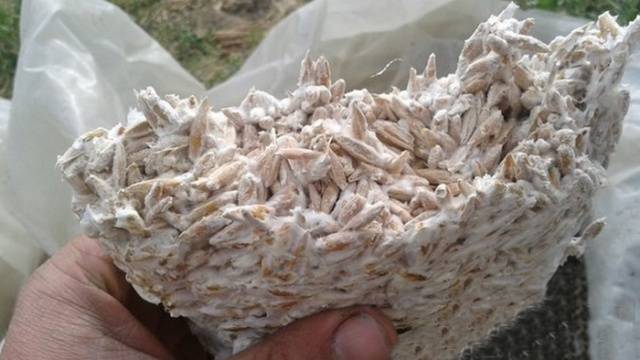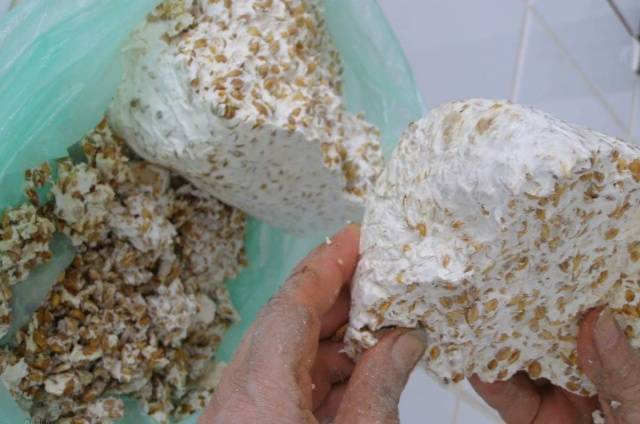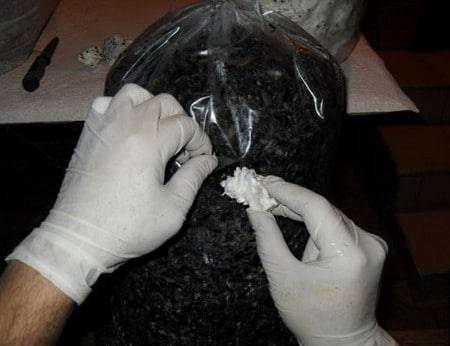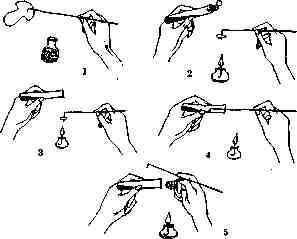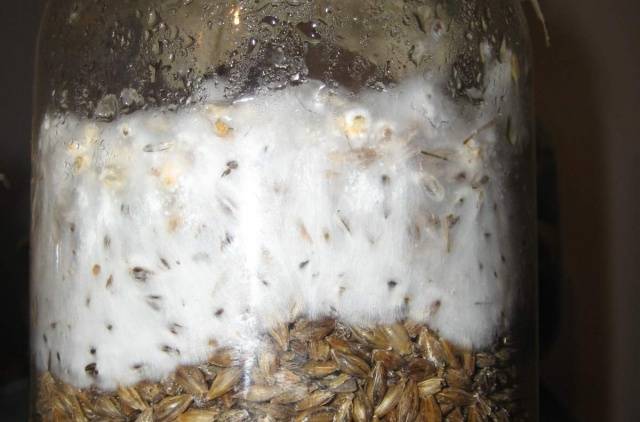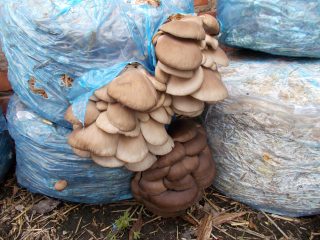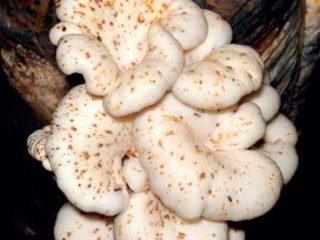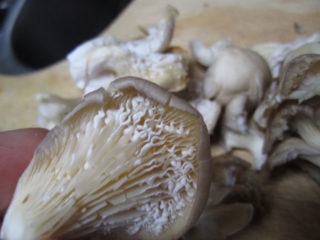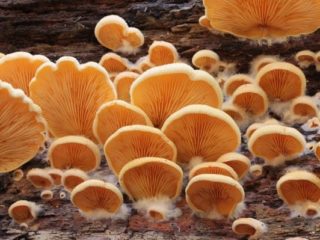Content
Growing mushrooms at home is a rather unusual activity. However, many mushroom growers do it very well. They manage to keep costs to a minimum by growing mycelium on their own. It happens that suppliers cannot give a 100% guarantee about the quality of the goods, and this cannot be determined by their appearance. As a result, the substrate may simply turn green over time and the mushrooms will never grow.
Growing mycelium on your own can save you money and also give you confidence in the future harvest. In this article we will try to reveal all the secrets of this process. You will learn how to make oyster mushroom mycelium at home.
What is mycelium
Oyster mushroom mycelium is a mycelium that must be planted in the substrate. Under suitable conditions, it will begin to germinate and yield its harvest. There are two options for how you can get mushroom mycelium at home. For this, you can use grain or wood. Most often, mushroom growers make grain mycelium. To do this, it is necessary to apply the mother cultures to the cereal substrate.
For the second option, you will need to prepare wooden sticks. This method is practiced in cases where the mushrooms will be grown on stumps or logs. Mycelium grown on wood sticks has strong immunity and is rarely exposed to various diseases. In addition, when propagated in this way, the material has a longer shelf life.
How to grow mycelium
Growing mycelium takes place in 3 stages:
- The mycelium is uterine. Such material is propagated in specially equipped laboratories. This requires spores that are stored in test tubes. Abroad, this process is strictly controlled and checked for compliance with the strain. But in Russia this is treated more simply and does not carry out breeding work. As a starting material, you can use not only spores, but also pieces of tissue from the fungus itself. This method is practiced less often, but no less effective.
- The mycelium is intermediate. This is the name of the material that is transferred from test tubes to a specially prepared nutrient base. More specifically, the intermediate material is a ready-made culture that is used to make seed mycelium.
- Sowing mycelium. At this stage, the material is transferred to the substrate for further growth of the fungi. It can also be used as a mother culture. This means that the mycelium can be grown again from the seed. For this, a cereal substrate is used.
Training
Of course, for growing oyster mushrooms at home, you need to create the right conditions. The highest quality product can be grown in a special laboratory. But if you do everything according to the instructions, then a pretty good mycelium can be obtained at home. Few people have a specially equipped laboratory at home. But its presence is not at all necessary. The main thing is that the room has gas, electricity and running water.
Then you will need the necessary equipment and fixtures. Be sure to purchase a thermometer, several pipettes, glass tubes, agar and tweezers. As you can see, most gadgets will serve you for a long time. So you need to make a one-time investment, and then just bribe materials as needed.
It's hard to imagine, but there are at least 5,000 microorganisms per square meter of the room.Often this number can rise to 20,000. Therefore, it is very important to take care of sterility and disinfection. The workplace should just sparkle, otherwise all efforts can go to waste.
There are 2 options for how you can grow oyster mushroom mycelium at home:
- Full growth cycle. The first method involves following all the steps described above. To begin with, take spores or a piece of the body of the mushroom. Then a mother culture is removed from it, from which an intermediate is subsequently obtained, and then inoculum.
- Abbreviated way. In this case, they purchase ready-made mycelium and grow mushrooms on their own.
The first stage is growing a mother culture
To grow uterine mycelium, you need to prepare fresh oyster mushrooms. As mentioned above, the material can be obtained from a portion of the mushroom itself. So, the oyster mushroom needs to be cut in half, and then cut a small piece at the top of the leg. Next, you need to place a piece of oyster mushroom in a special nutrient medium. However, the mushroom must be completely sterile. Therefore, it should be placed in peroxide for a couple of seconds. Then the test tube with the nutrient medium is held over the flame and the prepared piece of mushroom is immersed in it. The stopper for the test tube is fired over a fire and the glass container is tightly closed.
After the done, the tubes with the material should be transferred to a dark place. The air temperature in it should be about = 24 ° C. Within a few weeks, the finished material can be planted in the substrate.
The question may also arise, how to make a suitable nutrient base for growing a mother culture? So, it is also very easy to do with your own hands. To prepare a special medium, different types of agar are suitable:
- oat;
- potato-glucose;
- carrot;
- wort agar.
This medium is poured into tubes to be sterilized. Then they are installed slightly tilting. This is done so that the nutrient medium has more space. When the medium has completely cooled down, you can add the prepared piece of mushroom.
The second stage is the breeding of the intermediate mycelium
Next, they proceed to breeding mycelium. Intermediate mycelium is most often grown using cereal grains. Tested and quality grains are poured with water in a ½ ratio. Then they are boiled for about a quarter of an hour. After that, the grain must be dried and combined with calcium carbonate and gypsum.
Then the resulting mixture is filled into a glass container by 2/3. Then it is sterilized and a nutrient medium is added (a couple of pieces). The intermediate mycelium can grow in a couple of weeks. You can store such a mycelium for a long time. In suitable conditions, it will last up to three months. In the room for oyster mushrooms, the temperature should not be lower than 0 ° C and not higher than +20 ° C.
Now we come to the most important stage - the production of seed mycelium. Intermediate material, which is an active crop, can be used immediately or divided several times. It all depends on the purpose for which the oyster mushrooms are grown. If for yourself, it is better to gradually grow young fresh mushrooms.
The last stage is the production of seed mycelium
Oyster mushroom mycelium at this stage looks like a white lush bloom. It already has a rather pleasant smell of fresh mushrooms. The cultivation of the seed proceeds in the same way as the production of the intermediate mycelium. The prepared white bloom is placed in a jar with a substrate and waited for the mycelium to grow.Only one tablespoon (tablespoon) of the intermediate material is added to a liter container.
Conclusion
Growing oyster mushroom mycelium at home is a rather painstaking business that requires a lot of time and patience. However, you will receive high-quality hand-made material, and you will not worry if your mushrooms will grow or not. As you can see, anyone can grow oyster mushrooms at home. The production technology does not require expensive materials and equipment. The cultivation process takes place with little or no human intervention. And you can plant mycelium on ordinary stumps or logs.
